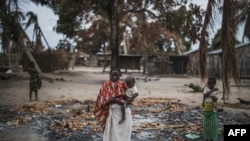The spread of the coronavirus and militant attacks are significantly impacting gas production in northern Mozambique, experts warn.
The U.S. oil-and-gas company ExxonMobil, one of the largest foreign investors in the southeast African country, this week decided to delay its final decision on a major long-term investment in Mozambique’s restive Cabo Delgado region.
“A final investment decision for the Rovuma liquefied natural gas (LNG) project in Mozambique, expected later this year, has been delayed,” the oil-and-gas giant said in a statement.
“ExxonMobil continues to actively work with its partners and the government to optimize development plans by improving synergies and exploring opportunities related to the current lower-cost environment,” it added.
The company also announced its capital investments for 2020 to be about $23 billion, down from the previously announced $33 billion.
While ExxonMobil acknowledged the impact of the coronavirus on the global economy, it didn’t indicate whether its decision on Mozambique projects was directly linked to the pandemic. Experts, however, believe COVID-19 has affected global energy prices, making it difficult for companies to raise project funding in the short term.
ExxonMobil didn’t immediately respond to a VOA request for comment.
As of Thursday, there have been 17 confirmed cases of the coronavirus in Mozambique.
Deteriorating security
Foreign companies such as Exxon, France’s Total, and Italy’s ENI are also worried by the deteriorating security around the gas-rich Cabo Delgado province and have been encouraging the Mozambique government to improve its response.
“Mozambique is now under a state of emergency because of COVID-19 and this will divert resources and attention from Cabo Delgado,” said Alex Vines, director of the Africa program at Chatham House.
Cabo Delgado has been the center of a growing Islamist insurgency that began in 2017. Ever since, terror attacks carried out by Islamist militants, some of which are affiliated with the Islamic State (IS) terror group, have killed hundreds of civilians in terror attacks.
100,000 Displaced
The violence has also displaced over 100,000 people in the impoverished province, according to the U.N.
In its 2019 Human Rights in Africa report, released this week, London-based rights group Amnesty International said Cabo Delgado continued to experience armed attacks believed to be carried out by members of an extremist group, locally known as al-Shabab, the IS affiliate in Mozambique.
“The attackers invaded villages, set houses on fire, hacked villagers to death with machetes and looted their food. Although the government increased its military presence in the region, its response was inadequate,” the report said.
Increased attacks
But in recent weeks, militants have significantly increased their attacks on government forces throughout Cabo Delgado. IS has claimed responsibility for at least three of the recent attacks in the province.
One of those attacks was on the town of Mocimboa de Praia, not far from several strategic LNG projects.
“Insurgent attacks should be of grave concern to the Mozambican government,” said Jasmine Opperman, an Africa analyst at the conflict monitoring group ACLED. “Following the Mocimboa de Praia attack, Total recalled all offshore vessels.”
“Insurgents have demonstrated a capacity to move from acts of terror against civilians to targeting government infrastructure,” she told VOA.
In the recent attacks, “insurgents also showed a capacity to hold territory for short periods with the intent to create ‘liberated areas’ which allows for freedom of movement and access to food supplies,” Opperman added.
David Matsinhe, a researcher for southern Africa at Amnesty International, told VOA that “it appears as if the insurgents are having a free reign in those districts, roaming around and attacking as they please, posting videos on social media to woo new recruits to replenish their ranks.”
Increased attacks claimed militants in recent months have led gas firms including ExxonMobil and Total to request additional security deployments in areas of operation to protect personnel and infrastructure development.
In February, several international oil-and-gas companies made a formal request to the Mozambican government to send additional security to Cabo Delgado. There are approximately 500 soldiers deployed near gas production areas with the companies seeking an additional deployment of another 300.
While foreign companies have their own security personnel, Mozambican security forces usually provide protection in the general zone where these companies operate.
Challenges
Analyst Opperman says the “COVID-19 has presented additional challenges” for the Mozambican government “such as containment, rotation of personnel,” noting that Exxon, which committed to $500 million in initial investment, “has seen disruption of early works due to coronavirus travel restrictions.”
Amid these challenges, rights groups are expressing concerns about the ability of Mozambican security forces to protect and maintain the rule of law.
“It is hard not to see this getting worse unless the virus decimates the armed groups too,” said Adotei Akwei, deputy director for Advocacy and Government Relations at Amnesty International.
This would be particularly difficult in “larger parts of Mozambique where the state is so weak as to not be present or where it is present but there is no real economic activity going on,” he told VOA.
On the investment front, some experts believe Mozambique’s recovery from the current financial crisis would be provisional.
“Mozambique’s advantage is that (its) gas assets are so world class, that I expect this funding shortfall to be a short-term problem unless the insecurity situation significantly deteriorates,” Vines of Chatham House predicted.
But Calton Cadeado, who teaches peace and conflict at Joaquim Chissano University in Maputo, says the interruption of foreign investment will frustrate particularly young people in Cabo Delgado, who hope that such projects would create job opportunities in their region.
“The government believes that this problem may be of short duration, and that 2022 will continue to be the year of expected financial funding,” he told VOA. “But realistically, this (coronavirus) pandemic and the consequent postponement (of foreign investment) could derail that.”
Amancio Vilanculos of VOA’s Portuguese Service contributed to this report from Washington.




